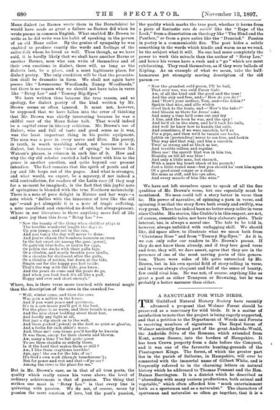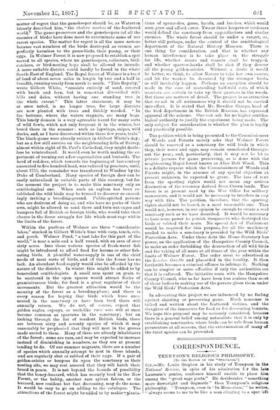A SANCTUARY FOR WILD BIRDS.
THE Guildford Natural History Society have recently advanced a proposal that Wolmer Forest should be preserved as a sanctuary for wild birds. It is a matter of satisfaction to note that the project is being eagerly supported, and that a petition to the Department of Woods and Forests is receiving numbers of signatures. The Royal forest of Wolmer anciently formed part of the great An.dreda-Weald, the Anderida Silva. of the Romans, which extended from Kent, across Sussex, into the borders of Hampshire. It has been Crown property from a date before the Conquest, and it was one of the favourite hunting-grounds of the Plantagenet Kings. The forest, of which the greater part lies in the parish of Selborne, in Hampshire, will ever be connected with the immortal name of Gilbert White, and is frequently referred to in the charming letters on natural history which he addressed to Thomas Pennant and the Hon. Dailies Barrington. It is a district which he described as "abounding with many curious productions, both animal and vegetable," which often afforded him 'much entertainment both as a sportsman and as a naturalist." The characters of sportsman and naturalist so often go together, that it is a matter of regret that the gamekeeper should be, as Waterton bitterly described him, "the cholera ntorbus of the feathered world." The game-preservers and the gamekeepers (of all the enemies of birds) have done most to exterminate.some of our rarest species. The matter for regret is all the more serious because vast numbers of the birds destroyed as vermin are perfectly harmless to the game-birds, their young, or their eggs. In Wolmer Forest it is now proposed to establish a spot sacred to all species, where no gamekeepers, collectors, bird- -catchers, or bird-nesting boys shall be allowed to intrude. A more suitable district could hardly be found in the whole South-East of England. The Royal forest of Wolmer is a tract of land of about seven miles in length by two and a half in breadth, running nearly from north to south. "This Royalty," wrote Gilbert White, "consists entirely of sand, covered with heath and fern, but is somewhat diversified with hills and dales, without having one standing tree in the whole extent." This latter statement, it may be at once noted, is no longer true, for large districts are now planted with trees and thickly wooded. "In tbe bottoms, where the waters stagnate, are many bogs. This lonely domain is a very agreeable haunt for many sorts of wild fowls, which not only frequent it in the winter, but breed there in the summer : such as lapwings, snipes, wild ducks, and, as I have discovered within these few years, teals." The black-game were already extinct in Gilbert White's day; but as a few still survive on the neighbouring hills of Surrey, almost within sight of St. Paul's Cathedral, they might doubt- less be reintroduced. It would even be worth making the ex- periment of turning out a few capercailzies and bustards. The herd of red-deer, which towards the beginning of last century amounted to five hundred head, was reduced by poachers, until, about 1755, the remainder was transferred to Windsor by the Duke of Cumberland. Many species of foreign deer can be easily naturalised in suitable parts of this country, but for the moment the project is to make this sanctuary only an ornithological one. When such an asylum has been es- tablished the wild birds may be trusted to discover so exceed- ingly inviting a breeding-ground. Public-spirited persons who are desirous of doing so, and who have no parks of their own, might be allowed to send there and turn out cages and hampers full of British or foreign birds, who would take their chance in the fierce struggle for life which must rage within the limits of the forest.
Within the purlieus of Weimer are three "considerable lakes," stocked in Gilbert White's time with carp, tench, eels, and perch. Wolmer Pond, "a vast lake for this part of the world," is near a mile and a half round, with an area of over sixty acres. Into these various species of fresh-water fish might be introduced to afford food for herons or other fish. eatingbirds. A plentiful water-supply is one of the chief needs of most sorts of birds, and of this the forest has no lack. An abundant food-supply would also be afforded by the nature of the district. In winter this might be added to by benevolent ornithologists. A small sum spent on grain to be scattered in the open spaces would attract flocks of graminivorous birds; for food is a great regulator of their movements. But the greatest attraction would be the security of the forest as a breeding-place ; and there is every reason for hoping that birds which have once nested in the sanctuary or have been bred there will annually return. We do not, of course, expect that golden eagles, ospreys, or such-like ram aces will at once become common as sparrows in the sanctuary ; but on looking through the list of resident British birds, there are between sixty and seventy species of which it may reasonably be prophesied that they will nest in the groves made sacred to them. Many of these are already inhabitants of the forest ; some are rare, and may be expected to increase instead of diminishing in numbers, as they are at present tending to do. Of our summer migrants, there are a number of species which annually attempt to nest in these islands, and are regularly shot or robbed of their eggs. If a pair of golden-orioles or hoopoes fix upon the sanctuary as their nesting site, we may rest assured that they will hatch their brood in peace. It is not beyond the bounds of possibility that the honey-buzzard, which has recently bred in the New Forest, or the hobby, another rare sylvan falcon, or the buzzard, now resident but fast decreasing, may do the same. It would be easy to go on adding to the catalogue. The attractions of the forest might be added to by makire-s plants.-
tions of spruce-firs, gorse, hazels, and larches, which would soon grow and afford cover. Two or three keepers or verderers would defend the sanctuary from egg-collectors and similar enemies. The whole forest should be under a ranger, or, better still perhaps, under the control of the ornithological department of the Natural History Museum. There is one thing for consideration, and that is whether any human interference is to take place in the struggle for life, whether stoats and weasels shall be trapped, and whether sparrow-hawks shall be shot if they devour all the young golden-orioles. Without a doubt it would be better, we think, to allow Nature to take her own course, and let the weaker be devoured by the stronger birds, as will inevitably happen. Perhaps an exception should be made in the case of marauding half-wild cats, of which numbers are certain to take up their quarters in the woods. But these are matters of detail. The project is so attractive that we ask in all seriousness why it should not be carried into effect. It is stated that Mr. Bowater Sharpe, head of the bird department in the British Museum, has expressed approval of the scheme. One can ask for no higher ornitho- logical authority to justify the experiment being made. The only subject for consideration is whether the plan is legally and practically possible.
The petition which is being presented to the Cominiasioners of Woods and Forests merely asks that Weiner Forest should be reserved as a sanctuary for wild birds in which they, their nests and eggs, may remain unmolested through- out the year; and, particularly, that it may not be let to private persons for game preserving, as is done with the neighbouring Royal forest known as Alice Holt Wood. This is a definite request which the Couunissioners of Woods and Forests might, in the absence of any special objection at present unknown, be expected to grant. The loss of rent from the sporting rights would not mean any serious diminution of the revenues derived from Crown lands. The forest is at present used by the War Office for military manceavres, and it would not be necessary to interfere in any way with this. The petition, therefore, that the sporting rights should not be leased, is a most reasonable one. This would not, however, in our opinion be enough to create a real sanctuary such as we have described. It would be necessary to have some power to punish trespassers who destroyed the birds or robbed their nests. No special Act of Parliament would be required for this purpose, for all the machinery needed to make a sanctuary is provided by the Wild Birds' Protection Acts. Under these Acts the Home Secretary has power, on the application of the Hampshire County Council, to make an order forbidding the destruction of all wild birds and the taking of all nests at all times of the year within the limits of Wollner Forest. The order must be advertised in the London Gazette and placarded in the locality. It then forthwith becomes a criminal offence to infringe it. Nothing can be simpler or more effective if only the authorities see that it is enforced. The initiative rests with the Hampshire County Council, who so far have been less zealous than most of those bodies in making use of the powers given them under the Wild Birds' Protection Acts.
In advocating this project we are influenced by no feeling against shooting or preserving game. Much nonsense is talked and written about the feathered victims, and the slaughter of the innocents for food or for decorating bonnets. We hope this proposal may be seriously considered, because there is a general belief among naturalists that it is only by establishing sanctuaries, where birds can be safe from human persecutors at all seasons, that the extermination of many of the rarer species can be prevented.







































 Previous page
Previous page